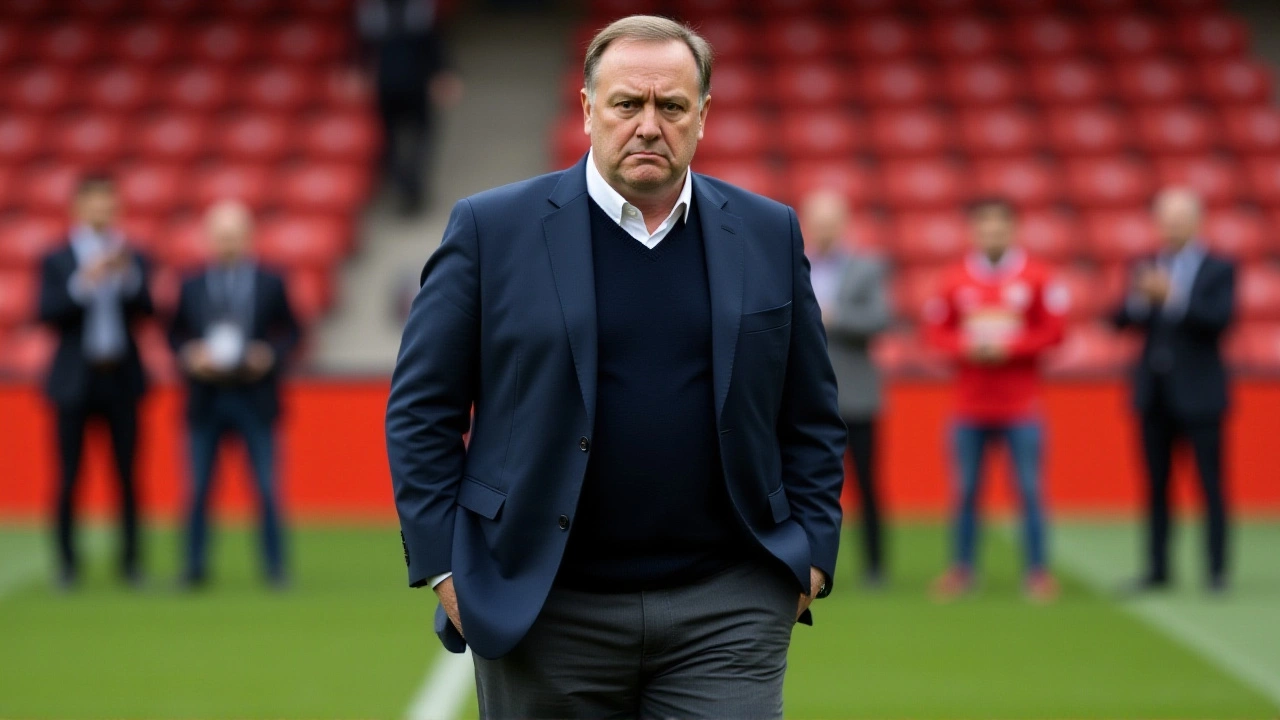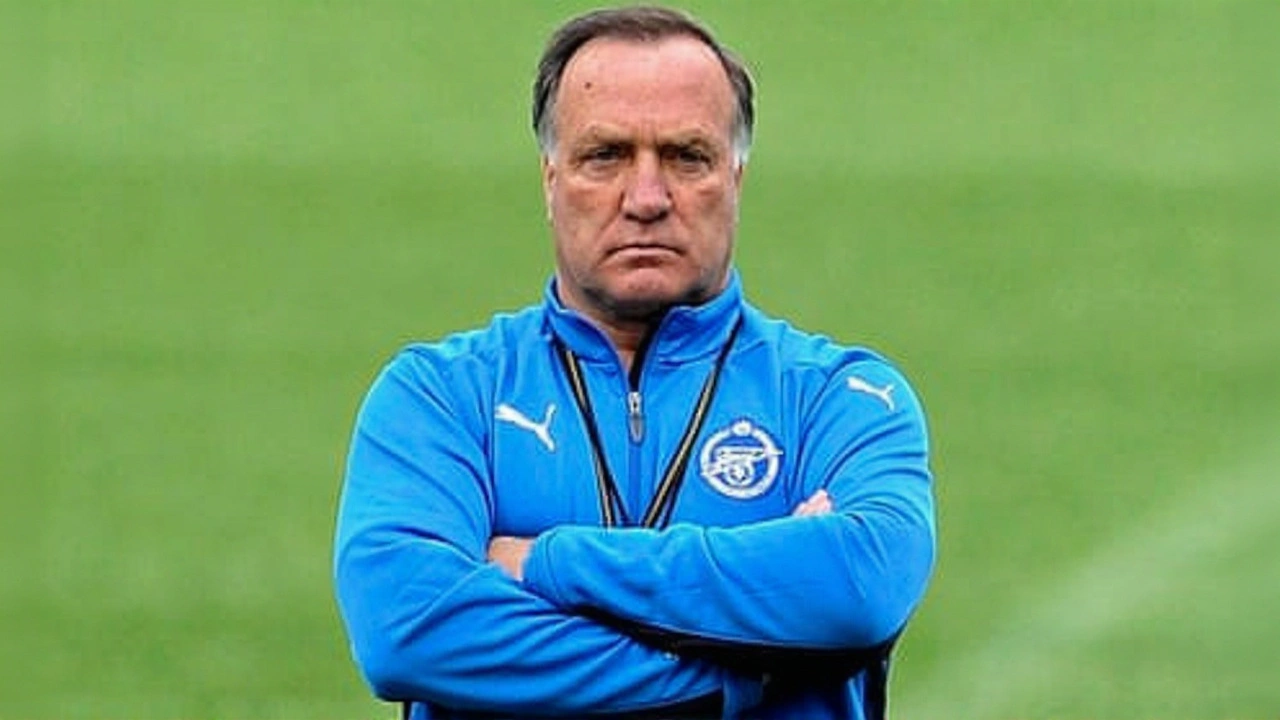When Dick Advocaat walked into the Stadium of Light in March 2015, Sunderland were drowning. Relegation loomed, morale was shattered, and fans had turned on manager Gus Poyet. Advocaat, then 67, wasn’t supposed to stay long — just see them through the final stretch of the 2014-15 season. But what followed was a rollercoaster of defiance, drama, and ultimately, a collapse that still stings for Black Cats supporters.
Salvation in the Spring
Advocaat’s first game was a 1-0 defeat to West Ham at the Boleyn Ground. No one expected miracles. But then came the Tyne-Wear derby. On April 5, 2015, Sunderland beat Newcastle 1-0 in front of a roaring home crowd. The goal, scored by Steven Fletcher, wasn’t just three points — it was a lifeline. The club had won just once in their previous 10 league games. Suddenly, Advocaat looked like a magician.He steadied the ship. A 1-1 draw at Stoke, then back-to-back 1-0 wins against Southampton and Everton. By May 24, Sunderland had survived. They finished 16th, two points clear of the drop. Advocaat, visibly emotional, announced his retirement. "I have decided to end my managerial career," he said. Fans applauded. Some cried. The Dutchman had done the impossible.
But then — the twist. On June 4, just two weeks later, Advocaat reversed course. He signed a one-year contract. "I couldn’t walk away," he later admitted in a quiet interview. "The club needed continuity. And I still had something to give."
The Summer of Hope — and High Costs
Advocaat went to work. He brought in players he knew from his PSV Eindhoven days. Jeremain Lens, the pacey Dutch winger, arrived for £8.8 million. Fabio Borini, the Italian striker who’d previously dazzled on loan at Sunderland, returned for £5.5 million. There were also Billy Jones, Lamine Koné, Jan Kirchhoff, and loan signings like Yann M'Vila and Ola Toivonen — another PSV alum.The signings looked smart on paper. But the squad was old. Too old. The average age crept above 29. The pace was gone. And the money? It was borrowed. Sunderland’s owners, Ellis Short and the Sunderland AFC board, had gambled big — and the clock was ticking.
Season Two: A House of Cards
The 2015-16 season started with a thud. On August 8, Leicester City — the eventual champions — crushed Sunderland 4-2 at the King Power Stadium. Then came the home defeat to newly promoted Norwich City on August 15. A 3-1 loss. The stadium fell silent. Fans booed. The club had won just one of its first seven league games.Advocaat’s only win that season came in the League Cup — a wild 6-3 thrashing of Exeter City on August 25. It was a flash in the pan. In the league, they were crumbling. A 2-2 draw with West Ham on October 3 felt like a moral victory. But it wasn’t enough.
The next day, October 4, 2015, Advocaat resigned. Sunderland sat 19th in the Premier League with just five points from eight games. He’d managed 19 games total for the club: 4 wins, 6 draws, 9 losses. The numbers were stark. The mood, darker.

Why It Fell Apart
The truth? Advocaat inherited a squad in decline. Poyet had left behind a team built on grit, not talent. Advocaat tried to impose structure, discipline, and experience — but the players were tired, aging, and out of sync. He didn’t have the time to rebuild. The transfer market didn’t help either. Lens and Borini never found rhythm. Toivonen looked lost. M’Vila was injured before he even started.And the tactics? Too cautious. Too slow. Sunderland played like a team afraid to lose — not one trying to win. They averaged just 0.9 goals per game in the 2015-16 season. In contrast, Leicester, who would go on to win the title, averaged 1.9.
"He was a great man, a great coach," said former captain John O’Shea years later. "But football had moved on. The Premier League wasn’t waiting for him to catch up."
The Aftermath and Legacy
Sunderland were relegated that season — and never recovered. They’ve spent the last eight years bouncing between the Championship and Premier League, haunted by the decisions made in 2015.Advocaat didn’t vanish. He took over Curaçao’s national team in 2016. Against all odds, he led the Caribbean island — with a population under 160,000 — to their first-ever World Cup qualifying campaign in 2022. "Arguably his greatest against-all-odds glory," as ESPN Africa put it in May 2024.
He returned to the Netherlands in November 2022, taking charge of ADO Den Haag in the Eerste Divisie. At 75, he guided them to a mid-table finish. Then, quietly, he retired. No fanfare. No press conference. Just a handshake and a nod.
At Sunderland, he’s remembered as the man who saved them — then broke them. A savior with a flaw: he was too late to the future.
Frequently Asked Questions
Why did Dick Advocaat reverse his retirement after saving Sunderland from relegation?
Advocaat initially retired after guiding Sunderland to safety in May 2015, citing age and exhaustion. But he reversed his decision on June 4, 2015, after club officials appealed to his sense of loyalty. He felt the squad needed stability and believed he could build on the momentum — a decision he later admitted was made without fully considering the club’s financial and generational challenges.
What impact did Advocaat’s signings have on Sunderland’s performance?
The signings — Lens, Borini, Toivonen, and others — were high-profile but poorly timed. Most were over 28, with little recent Premier League experience. Lens, despite his PSV pedigree, scored just once in 21 league appearances. Borini was inconsistent. The squad’s average age rose to 29.5, making them slow and vulnerable to high-pressing teams like Leicester. The money spent didn’t translate to goals or wins.
How did Sunderland’s form compare under Advocaat in 2015 versus 2015-16?
In the final 10 games of 2014-15, Advocaat’s side earned 16 points from 10 matches (4W, 4D, 2L), a remarkable turnaround from Poyet’s disastrous run. But in the 2015-16 season, over the first 8 games, they managed only 5 points (1W, 2D, 5L). The drop-off was stark — from near-safety to bottom of the table — revealing how fragile the earlier success had been.
What was Advocaat’s tactical approach at Sunderland?
Advocaat favored a disciplined 4-4-2 with compact defending and quick counterattacks. He emphasized set pieces and physicality — traits that worked against relegation-threatened sides in spring 2015. But against top-half teams with pace and pressing, like Leicester and Norwich, his system collapsed. He rarely adjusted, and his lack of substitutions or tactical flexibility became a liability.
How is Dick Advocaat remembered in Sunderland today?
He’s remembered with ambivalence. Older fans credit him with saving the club from relegation in 2015 — a feat few thought possible. But younger supporters see him as the architect of the club’s decline, whose stubbornness and outdated methods led to a catastrophic 2015-16 season. His legacy is a paradox: savior and cautionary tale, all in one.
Did Advocaat ever comment on his Sunderland tenure after leaving?
In a 2020 interview with Dutch outlet Voetbal International, Advocaat said: "I gave everything. But football is cruel. You can do everything right — sign the right players, win the right games — and still be judged by one bad season. I’m proud of what we did in March. The rest? That’s not my story to tell."



